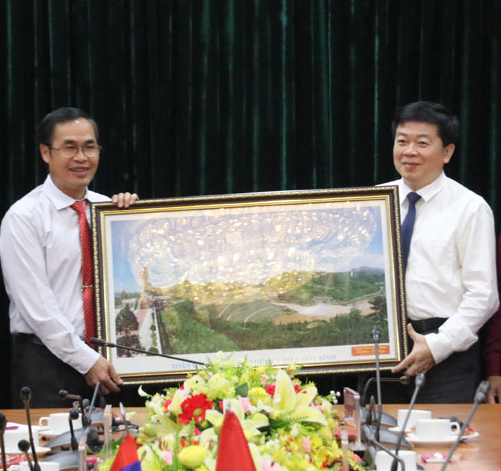
(HBO) – A working delegation from the Lao province of Houaphan led by Vice Governor Phusone Thammavisay paid a working trip to the northern province of Hoa Binh. Vice Chairman of the provincial People’s Committee Nguyen Van Chuong received and held a working session.
At the working session, both sides discussed
issues of shared concern, especially those in agriculture, forestry and rural
development, and socio-economic performance in the recent past.
The Vice Governor of Houaphan expressed his
delight at the warm welcome given by the provincial authorities. He suggested
that Hoa Binh offer continued support to Houaphan in workforce training, send
businesses to the Lao province for field survey and conduct exchanges to share
experience.
Vice Chairman of the provincial People’s
Committee Nguyen Van Chuong welcomed the Lao delegation to the province. He
spoke highly of achievements made by the two countries in general and the two provinces in particular
in economy, politics, socio-culture. He wished that the two localities would
foster sustainable partnership in agriculture, thereby strengthening Vietnam –
Laos special friendship, as well as friendship between the two provinces, thus gradually
lifting bilateral ties to a greater height.
On behalf of the provincial authorities,
Vice Chairman of the provincial People’s Committee Nguyen Van Chuong presents a
picture of Uncle Ho at Hoa Binh hydropower plant to the Lao delegation.
Phusone Thammavisay wished Chuong and leaders of
Hoa Binh province’s departments and agencies good health, and friendship and
cooperation between the two nations everlasting growth.
On October 17, the delegation visited an
irrigation system for agriculture, a fruit cultivation area and a chicken farm
in the locality./.
The Standing Board of the Hoa Binh provincial Party Committee has agreed in principle on a proposal by the Standing Board of the Party Committee of Hoa Binh city to gather feedback on the city’s 1:2000 zoning plan, which forms part of its broader urban development strategy.
Hoa Binh province has made notable progress in public administration reform and digital government development, with the satisfaction index among citizens and businesses reaching over 84%, according to recent government evaluations.
Thanks to great efforts by local authorities in recent times, the governance and public administration performance of Mai Chau district has been significantly improved.
In the afternoon of June 6, the Party Committee, the People's Council, the People's Committee and the Fatherland Front of Lac Son district solemnly held a meeting to celebrate the 139th anniversary of the district's founding (1886–2025) and the 79th anniversary of the establishment of the district's Party Committee (1946–2025). There was the attendance of Mr. Bui Van Thang, the Vice Chairman of the Provincial People's Council; Mr. Quach Tat Liem, the Vice Chairman of the Provincial People's Committee; Ms. Dang Bich Ngoc, the Deputy Head of the National Assembly Delegation of the province; as well as the former leaders of the province and district through various periods, who are the natives of the district.
Implementing the Politburo’s Resolution No. 57-NQ/TW on breakthroughs in science – technology, innovation, and digital transformation is a golden opportunity for the northern mountainous province of Hoa Binh to renew growth model, improve competitive edge and shorten digital gap.
Resolution 57-NQ/TW, issued by the Politburo on December 22, 2024, identifies sci-tech, innovation, and digital transformation as strategic breakthroughs to build a developed and prosperous nation. In Hoa Binh province, this spirit is not just a slogan, it’s being put into action through concrete initiatives that form a "new development triangle”: digital citizenship, digital economy, and digital administration.



